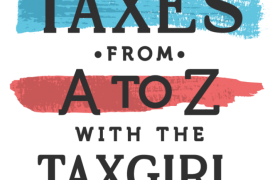It’s my annual Taxes from A to Z series! This time, it’s Tax Cuts and Jobs Act (TCJA) style. If you’re wondering whether you can claim house office expenses or whether to deduct a capital loss under the new law, you won’t want to miss a single letter.
Y is for yegg.
A little history for you: The word yegg, which means burglar or safecracker, has been around for more than 100 years. also yegg-man, 1901, a word popular in the first decade of the 20th century and meaning vaguely “hobo burglar; safe-breaker; criminal beggar.”
The exact origin of the term isn’t clear, but the infamous Pinkerton agency detectives popularized it. The nickname may be derived from “John Yegg,” a pseudonym for the first safe-cracker to use nitro-glycerine. William A. Pinkerton reportedly used the term to refer to criminals around the turn of the century. A series of newspaper articles detailing the Pinkerton detectives take-down of the Yegg-Men also appeared around that time, including pieces in the San Francisco Sunday Call.
(There’s an alternate theory that the word hails from the German Jäger for huntsman, but my husband, who is fluent in German, is not impressed by that idea.)
So what does yegg – or the yegg-men – have to do with taxes? Everything. Under federal tax law, taxpayers must report “all income from whatever source derived” unless specifically excepted (you’ll find that rule at 26 U.S. Code §61). That includes all illegal activities like safecracking and burglary, as well as illegal gambling and bribes. In fact, the IRS has a program, the Illegal Source Financial Crimes Program, as part of its Criminal Investigations Department, which enforces tax rules on income obtained through illegal operations which would otherwise be part of the “untaxed underground economy.”
Not convinced? Ask Al Capone. He reportedly boasted, “They can’t collect legal taxes from illegal money.” He found that wasn’t true on this day October 17, 1931, when he was sentenced to prison for tax evasion.
(You can read more about Capone here.)
The tax lesson to be learned? Don’t make a bad situation worse. Skipping out on reporting income – even illegally gained income – can land you in tax trouble. Whether you’re a yegg or a con, a gangster or a deal rat, a dealer or a thug, you should consult with a tax professional.
For more Taxes From A To ZTM 2019, check out the rest of the series:
- A is for Alimony
- B is for Bracket Creep
- C is for Credit For The Elderly Or The Disabled
- D is for Due Dates
- E is for Earned Income Tax Credit (EITC)
- F is for Fair Debt Collection Practices Act (FDCPA)
- G is for Gross Estate
- H is for Home Office Deduction
- I is for Innocent Spouse
- J is for Jackpot
- K is for Kiddie Tax
- L is for Long-Term Capital Gains or Losses
- M is for Medical Expenses
- N is for Notice
- O is for Opportunity Zone
- P is for Pass-Through Deduction
- Q is for Qualified Business Income
- R is for Real Estate Investment Trust
- S is for Security Deposit
- T is for Trust Fund Taxes
- U is for Unadjusted Basis
- V is for VITA
- W is for Withholding
- X is for Schedule X




